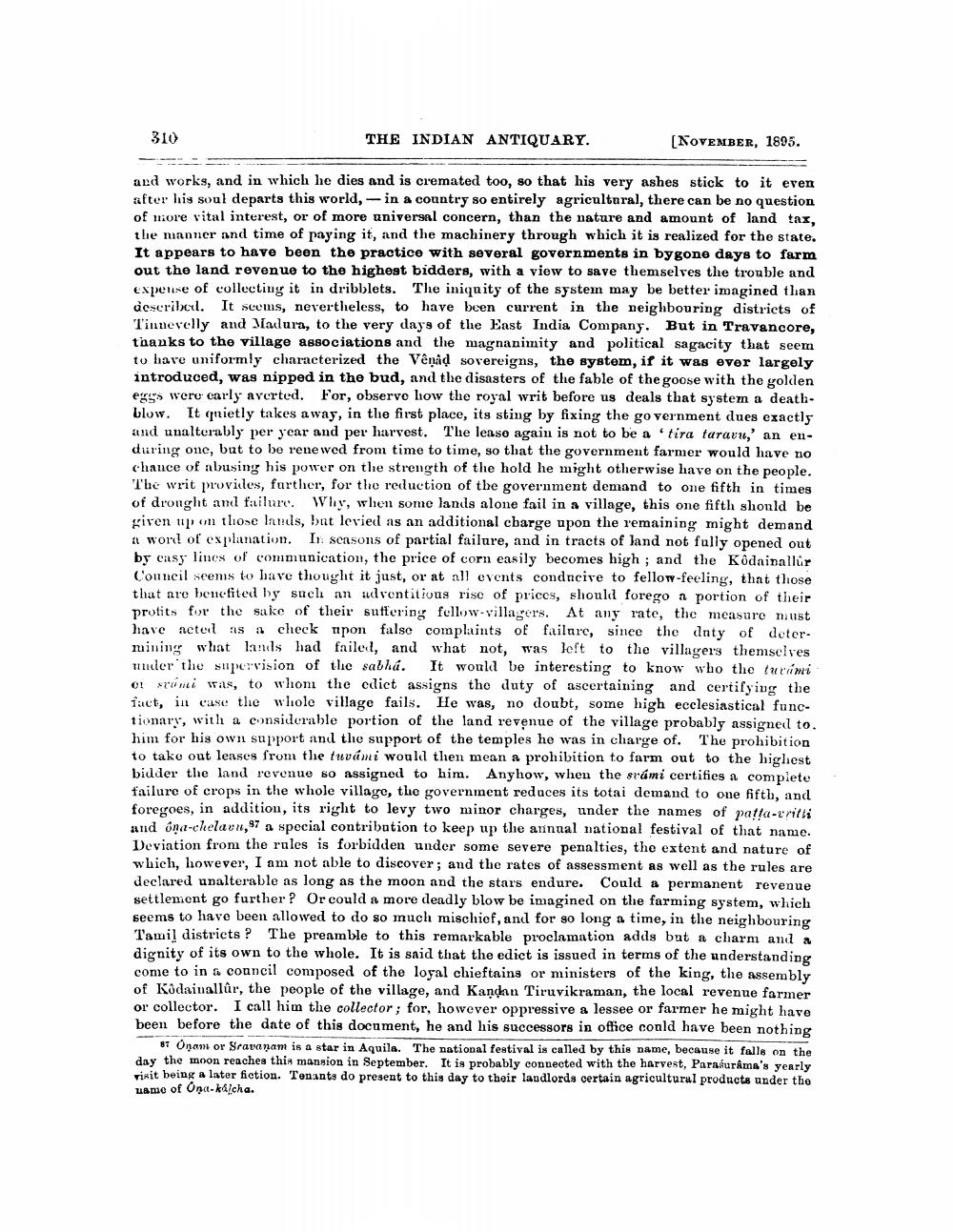________________
THE INDIAN ANTIQUARY.
[NOVEMBER, 1895.
and works, and in which he dies and is cremated too, so that his very ashes stick to it even after his soul departs this world, in a country so entirely agricultural, there can be no question of more vital interest, or of more universal concern, than the nature and amount of land tax, the manner and time of paying it, and the machinery through which it is realized for the state. It appears to have been the practice with several governments in bygone days to farm out the land revenue to the highest bidders, with a view to save themselves the trouble and expense of collecting it in dribblets. The iniquity of the system may be better imagined than described. It seems, nevertheless, to have been current in the neighbouring districts of Tinnevelly and Madura, to the very days of the East India Company. But in Travancore, thanks to the village associations and the magnanimity and political sagacity that seem to have uniformly characterized the Vênâd sovereigns, the system, if it was ever largely introduced, was nipped in the bud, and the disasters of the fable of the goose with the golden eggs were carly averted. For, observe how the royal writ before us deals that system a deathblow. It quietly takes away, in the first place, its sting by fixing the government dues exactly and unalterably per year and per harvest. The lease again is not to be a tira taravu,' an enduring one, but to be renewed from time to time, so that the government farmer would have no chance of abusing his power on the strength of the hold he might otherwise have on the people. The writ provides, further, for the reduction of the government demand to one fifth in times of drought and failure. Why, when some lands alone fail in a village, this one fifth should be given up on those lands, but levied as an additional charge upon the remaining might demand a word of explanation. In seasons of partial failure, and in tracts of land not fully opened out by easy lines of communication, the price of corn easily becomes high; and the Kôdainallur Council seems to have thought it just, or at all events conducive to fellow-feeling, that those that are benefited by such an adventitious rise of prices, should forego a portion of their profits for the sake of their suffering fellow-villagers. At any rate, the measure must have acted as a check upon false complaints of failure, since the duty of determining what lands had failed, and what not, was left to the villagers themselves under the supervision of the sabha. It would be interesting to know who the turámi e srumi was, to whom the edict assigns the duty of ascertaining and certifying the fact, in case the whole village fails. He was, no doubt, some high ecclesiastical functionary, with a considerable portion of the land revenue of the village probably assigned to. him for his own support and the support of the temples he was in charge of. The prohibition to take out leases from the tuvámi would then mean a prohibition to farm out to the highest bidder the land revenue so assigned to him. Anyhow, when the svámi certifies a complete failure of crops in the whole village, the government reduces its totai demand to one fifth, and foregoes, in addition, its right to levy two minor charges, under the names of patta-vrith and ona-chelavu,97 a special contribution to keep up the annual national festival of that name. Deviation from the rules is forbidden under some severe penalties, the extent and nature of which, however, I am not able to discover; and the rates of assessment as well as the rules are declared unalterable as long as the moon and the stars endure. Could a permanent revenue settlement go further? Or could a more deadly blow be imagined on the farming system, which seems to have been allowed to do so much mischief, and for so long a time, in the neighbouring Tamil districts? The preamble to this remarkable proclamation adds but a charm and a dignity of its own to the whole. It is said that the edict is issued in terms of the understanding come to in a council composed of the loyal chieftains or ministers of the king, the assembly of Kôdainallûr, the people of the village, and Kandan Tiruvikraman, the local revenue farmer or collector. I call him the collector; for, however oppressive a lessee or farmer he might have been before the date of this document, he and his successors in office conld have been nothing
310
-
87 Onam or Sravanam is a star in Aquila. The national festival is called by this name, because it falls on the day the moon reaches this mansion in September. It is probably connected with the harvest, Parasurâma's yearly visit being a later fiction. Tenants do present to this day to their landlords certain agricultural products under the name of Ona-kalcha.




